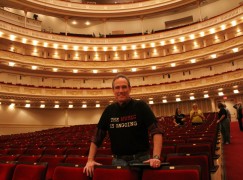Anna-Maria Hefele, a singer living in Munich, has mastered the art of overtone singing.
In the week since she has posted this video, it has received well over a million hits.
Watch. Be amazed.

Anna-Maria Hefele, a singer living in Munich, has mastered the art of overtone singing.
In the week since she has posted this video, it has received well over a million hits.
Watch. Be amazed.

It has floated at the edge of musical consciousness for decades in pirate releases of terrible quality.
It’s the only performance of a Mahler work ever given by the ultimate conductor, Carlos Kleiber, who spent a year thinking about it and a night deciding to eliminate the composer from his repertoire.
Now, the Vienna Symphony Orchestra have released a clean master-tape of the concert.
Must be heard to be believed.
It’s my five-star Album of the Week on sinfinimusic.com. Read here.

This just in from the young Viennese violinist, Daniel Auner:
Yesterday I was flying from Amsterdam to Sao Paulo with my violin. The KLM crew were very nice and took special care of my very old half Viennese- half Italian Violin from 1709. Afterwards they wanted to make a picture with it and hear me play.

David Gockley has announced he’ll retire in 2016, after ten years at the head of San Francisco Opera. Before that he ran Houston Grand Opera for 33 years. David Gockley will be 73 when he steps down.

Musicians at the Orchestre Philharmonique de Radio France have called a second one-day strike this Friday to protest plans for a creeping staff merger with the Orchestre National and the departure of their artistic administrator, Eric Montalbetti.

Paris is heading for a winter of maestro discontent. Paavo Järvi has already handed in his cards at the Orchestre de Paris. Mikko Franck has said he won’t sign concert contracts this season until he has assurances for the future of the Philharmonique and Daniele Gatti is unlikely to last long at the National now he has been chosen as chief conductor at the Amsterdam Concertgebouw.
We hear that the musicians of the Atlanta Symphony are going into session with the federal mediator tomorrow, after which both sides are under oath to keep their mouths shut. That should be easier for the musicians than for the heads of the Woodruff Arts Center who, in unguarded interviews, have cast doubts on the sanity of the musicians and the probity of their supporters.
If Atlanta is ever to recover its equilibrium, a week of Trappist vows is what’s required.

Hundreds gathered this afternoon at Copenhagen’s main railway station to protest the Danish Radio’s decision to abolish the Danish Radio Chamber Orchestra. The demo was led by members of the Copenhagen Philharmonic and ended with the singing of the national anthem.
There were further demos on the streets of the city, one of them led by national treasure Michala Petri.
We’re expecting video shortly.
Meanwhile, here are first pics.


(c) Mahan Esfahani
In a rare act of total transparency, the Rina Sala Gallo piano competition in Monza has revealed the marks given by every member of the jury to every contestant. The publication was provoked by a jury walkout on the part of the French pianist Pascal Rogé, who claimed the result was being rigged by Italians in favour of their compatriots.
M. Rogé, it appears, may have been unaware of this competition’s rule that exceptionally high or low marks given by one judge to particular candidates would be discounted. Be that as it may, the spread of marks is interesting – especially those given to some who did not make the semi-finals. You can read the markings here.
M Rogé’s remarks on the competition have provoked international discussion. However, if the unintended result is an opening up of competitions to ensure honesty and accountability then the Rina Sala Gallo will have done the tainted competition industry a great service.
This should be the benchmark by which future competitions are run.

The Competition today issued the following press release:
Rogé toasts to his own voting errors.
French pianist’s own marks determine the victory of the pianists he wanted to exclude, and accuses his colleagues of fraud.
With regard to Pascal Rogé’s statements on his Facebook page, subsequently published on SlippedDisc, the analysis of the jurors’ marks reported in attachment and explained below, shows that Mr. Rogé’s votes were prevalently maximum (10.00) or very close to the lowest (3.00 in the 1st & 2nd Rounds – 6.00 in the 3rd Round) marks.
Regarding the total number (46) of votes in all three rounds, he gave the highest mark 14 times and the lowest mark 21 times. However, the official rules of the competition, which every juror received via e-mail, state clearly that the lowest and highest marks, in the first three rounds of the competition, would have been invalidated. This is also stated clearly on the competition’s website: www.concorsosalagallo.it
As a result, the final outcome, which was based on the combined average of all three rounds marks, turned out to be entirely opposite to what Mr. Rogé wanted and expected. He thus managed, in the Third Round, to invalidate the votes he gave to Yano Yuta (10.00) and Yejin Noh (10.00), whereas his vote to Atsuko Kinoshita (8.50), the candidate whose performance of Schubert and Debussy he denigrated on his Facebook page to all those who had access to it, actually facilitated her admission into the Final. Similarly, his intention to exclude Pascalucci and Bortoluzzi, the Italians he accused to be “favoured” by the “mafia”, by giving them the lowest marks, produced the diametrically opposite effect. As a consequence, Maestro Rogé preferred to turn the tables and promptly leaving the competition, discredit the work of his colleagues, who quite to the contrary, acted in accordance with the rules that they had accepted and signed.
For these reasons, the Rina Sala Gallo Association requires Maestro Rogé to issue an immediate written apology for failing to fulfill the duties that his position required, i.e. to respect the rules, and for having abandoned the jury – unilaterally terminating the contract he had signed – divulging false and misleading information, and discrediting the Competition, which will now proceed with a legal claim for damages.
Monza, Oct. 6th 2014
I published the first review in the Wall Street Journal this weekend of a groundbreaking biography of Charlotte Moorman, energising icon of the musical avantgarde. Half a century after her blazing provocations, Charlotte appears in Joan Rothfuss’s book as a seminal – even necessary figure. Read my review here.

Extract: During “Originale,” Moorman took off her dress and played “startlingly nude,” as Ms. Rothfuss puts it. In “Human Cello,” by Paik, she drew a bow across the composer’s naked torso, gripped between her legs. She played “The Swan” by Saint-Saëns in see-through cellophane and “Véxations” by Satie with breasts bobbing over the keyboard. In Yoko Ono’s “Cut Piece,” she sat impassive on the floor while audience members cut off her clothes. These were heady, crazy events, harbingers of a new concept of public performance.
From a correspondent at the Philharmonie:
Cameron Carpenter opened the organ season of the Berlin Philharmonie for the third year in a row under the title of “organist in residence”. The hall was nearly full for his all Bach program. At the end of the first work on the second half (Bach’s Fantasia and Fugue in C Minor BWV 537), a very loud note continued to sound in the Philharmonie’s Schuke organ (ostensibly newly refurbished), causing Carpenter to leave the stage after accepting the applause. Nearly a fifteen minute period ensued during which various hall technicians tried to repair the organ, and after the instrument was turned off then back on the sound continued. Some patrons were seen running from the auditorium with hands over ears. Finally an announcement was made that the problem was unrepairable, and that Carpenter would continue on the piano rather than end the concert. The Steinway D was brought up on the stage elevator and Carpenter appeared, beginning with Chopin’s Etude in C# Minor (Op. 10, No. 4) and continuing with selections from JS Bach’s Well-Tempered Clavier (I believe the D Major from Book II), a work by Medtner (I didn’t catch which one, about four minutes long in a minor key), Grainger’s “Handel in the Strand”, an improvisation in jazz style on Gershwin’s ‘Embraceable You’, and finally the Bach-Busoni Chaconne, to wild reception. Encores at the piano included (I think) Rachmaninoff’s arrangement of Bach’s Sinfonia from Cantata 29, and a jazz rendering of “Bist Du bei Mir’.
